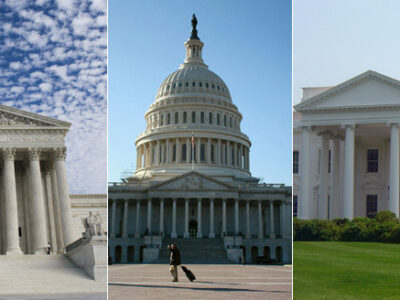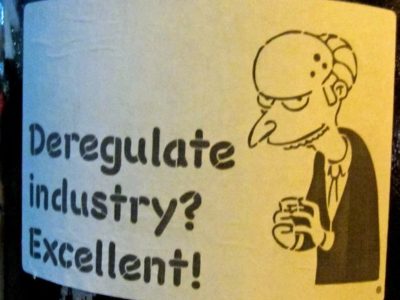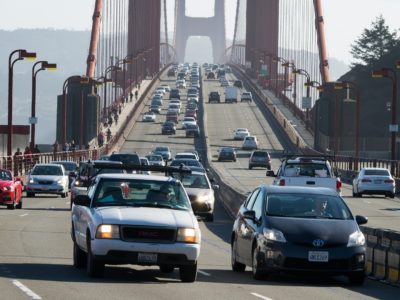administrative law
Environmental Rollbacks: Will the Trump Administration Overplay Its Hand?
The odds are good that Trump agencies will go too far out on a limb.
The Trump Administration’s tendency to rely on bold legal arguments rather than detailed technical ones is a disadvantage in court. Courts defer to agencies on factual matters, especially those that involve technical expertise. Now that Chevron has been overruled, however, legal arguments by agencies don’t get the same deference. Thus, the chances of a judicial reversal are higher when the agency relies on purely legal grounds.
CONTINUE READINGNo, DOE, You Can’t Roll Back Product Efficiency Standards
Congress wanted greater energy efficiency over time and banned rollbacks.
The Department of Energy is proposing to rescind key energy efficiency requirements. It is beyond ironic that it is attempting to do so at a time when the President has proclaimed an energy emergency. Trump says the grid is struggling desperately to meet surging power demand. That’s a strange time to eliminate regulations that are saving energy. DOE’s action is also illegal, because the law in question has a provision prohibiting rollbacks. Congress wanted efficiency standards to get tougher over time and included an anti-rollback provision to make sure of that.
CONTINUE READINGPermitting Reform as Policy Stability
Compromise Congressional legislation could dampen the swings of Presidential regulatory policy
I’ve noted earlier the problems that rapid swings in regulatory policy at the Presidential level have caused over the past 12 years, swinging from Obama to Trump I to Biden to Trump II. And, as in so many other ways, the second Trump Administration is ramping up the swings to a whole new level, with …
Continue reading “Permitting Reform as Policy Stability”
CONTINUE READINGPrecedent, the Trump Administration, and Endangered Species
A new Trump Administration initiative misinterprets the overruling of Chevron
The Trump Administration’s effort to strip away protections under the Endangered Species Act that had previously been upheld by the Supreme Court. The Administration seems to think they’re entitled to ignore that earlier decision because it was decided under the Chevron test and Chevron has since been overruled. They’re wrong. If it wishes to change the existing interpretation, the agency must give a reasoned argument for doing so that discusses the relevant policy issues, including reliance and the impact of its decision on endangered species.
CONTINUE READINGCorroding the Separation of Environmental Powers
“Who decides?” is the first question to ask about a policy issue. Trump’s answer is “me.”
Biden took actions that federal courts ruled exceeded statutory authority, raised separation of powers issues, or threatened federalism. The difference is that Trump has used brute-force attacks on agencies plus extortion against states rather than taking overt legal actions that courts can review.
CONTINUE READINGRegulatory Rollbacks: What to Expect
A replay of 2017? Or maybe something more radical? You can probably guess the answer.
Repealing and replacing existing environmental regulations will have a lower priority in this iteration of the Trump presidency – it will often be easier to just ignore the existing regulations or eliminate the regulators rather than the regulations. When it does rollback regulations, the administration will probably take more extreme legal positions and will be more likely to make constitutional arguments against environmental regulation.
CONTINUE READINGThe Downsides of Ping Pong Governance
Judicial review, by moderating policy swings, may be important to facilitating long-term investment
I’ve written about debates over permitting reform and other versions of regulatory streamlining to support the development of infrastructure that we need to address climate change. Another view, well articulated by Nicholas Bagley at University of Michigan, is that the problem is more fundamental: Excessive focus on governmental procedures and process, reinforced by searching judicial …
Continue reading “The Downsides of Ping Pong Governance”
CONTINUE READINGEPA Jumps the Shark
Just as a past dictator rejected modern genetics, Trump rejects climate science. For both, evidence was no match for ideology and ego.
Honestly, EPA’s embrace of climate denial is just plain embarrassing. And the rest of the world will justifiably view it as one more sign that the U.S. has taken leave of its senses. Trump can change the name of a water body on maps, but he can’t change scientific reality. The scientific evidence about the reality of climate change, its causes, and its harms is incredibly well-established. It’s based on many different types of data and models, which have been tested and retested.
CONTINUE READINGTrump’s Seven Most Anti-Environmental Moves — and How to Push Back
There were dozens of actions, all harmful to the environment. These are the worst of the worst.
In the month since he reentered the White House, Trump has dedicated himself to knee-capping environmental protection through a series of executive orders. These orders aim to eliminate crucial environmental regulations, eviscerate key agencies like EPA, arbitrarily halt government funding, and eliminate environmental restraints on the private sector. But these are not done deals, and there are ways of pushing back.
CONTINUE READINGThe California Car Waiver and the Congressional Review Act
Trump has found a possible way to end run California’s legal arguments for the waiver. But there’s no reason to give up.
If the CRA resolution does go through, California should wait until after the midterms, when Democrats are favored to take the House, and then try again with different formulated regulations. When the Trump Administration rejects them, it could then litigate whether the new versions were “substantially the same” as the old ones.
CONTINUE READING










